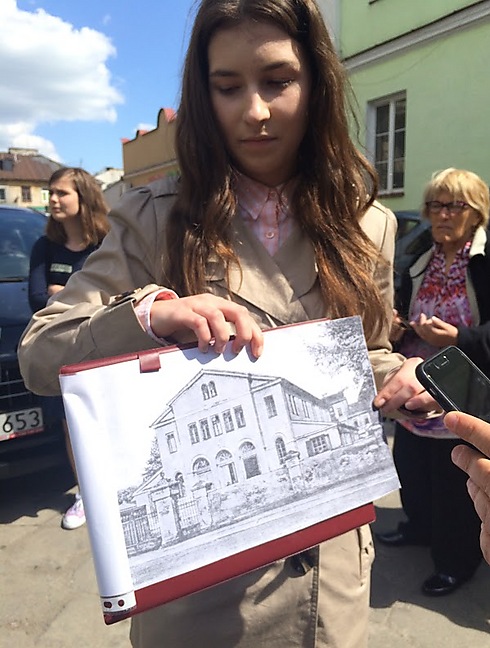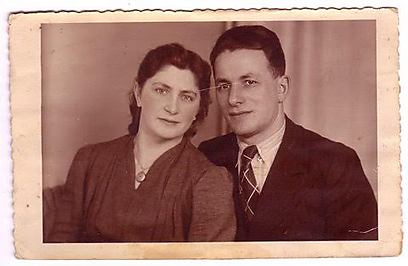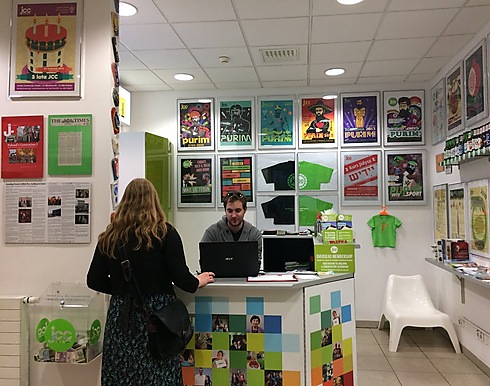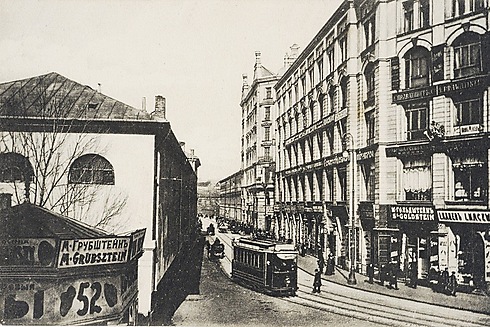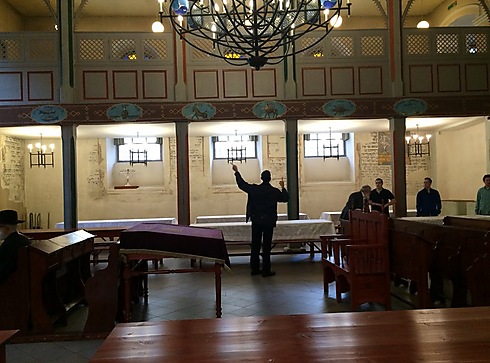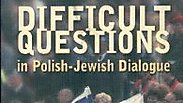
A journey of love and darkness
I did not expect to enjoy my time in Poland, but something prompted me to further explore my identity, to breathe the same air my grandparents did, and to connect to my roots. Yet as it turned out, in Poland I discovered the girls of Siedlce who live and breathe Jewish history, and the youth of Warsaw who wish to make amends. The third and fourth generations of post-war Poles miss the Jews, and it was in Poland of all places that I had my most meaningful spiritual Jewish experience.
A trip to Poland is usually a journey to the Holocaust, to the world’s largest Jewish cemetery and scene of unimaginable catastrophe that human beings like us unleashed upon other humans like us. However, I soon realized that I had arrived in another Poland.
The Holocaust is everywhere in this beautiful, lusciously green country. It permeates the ground and the air, and precisely because of that it is both odd and fascinating to encounter young, Jewish men and women who are trying to revive Jewish life in Warsaw.
The Poles who head our host organization, Forum for Dialogue Among Nations, also wanted to emphasize to us the current issues in Poland - politics, social issues, the economy, and various challenges – as well as the trends that shape their reality. The meetings they arranged for us with activists, journalists, academicians, and others quickly turned into open, fascinating conversations, and their very interest in this Polish-Jewish dialogue revealed the importance they attribute to the Jewish story.
We were touched to meet young, non-Jewish students involved in the Forum's school project. They guided us through the streets of their town, Siedlce, and taught us about Jewish history there - the fruit of research and interviews with family members and city elders. They showed us where the synagogue and Jewish school were located, and even took us to a brick wall they think served as the ghetto’s perimeter fence.
We followed them fascinated, sharing in their excitement, and when I spoke with some of them I could not help but wonder why they even care about this, and why is this possible now? Young women who are members of the third and fourth post-war generation are making history. Gradually I realized how similar everything was, and how much work the third generation faces in reviving the memories and stories of their silent parents and grandparents. This is the last generation that can still turn to those who lived during that critical period with questions.
'Holocaust is everywhere'
Elsewhere, we heard the desire of young Poles not only to learn about this history, but also to recollect and experience something of the Jewish culture that no longer exists in their country. This absence of Jews and a similar longing prompted young Moroccans to set up the "Mimouna Club" in Morocco, and it now prompts the Poles to organize festivals dedicated to Jewish culture that draw a large non-Jewish audience.
It seems as though in a different yet deeply similar way, the same longing for what has been erased and taken away prompts members of our generation to undertake the revolution of the Jewish liturgical poem – the piyyut - in Israeli culture, and also to initiate the movement for Jewish renewal in Israel.
And back to Warsaw: It turns out that a young and active Jewish community exists today, mostly comprising families. The Jewish community center here opened two years ago. Activities are formulated in cooperation with community members and in line with their needs, including a club for children, Judaism lesson, and even a Hebrew school.
These activities are orchestrated by Agata Rakowiecka, the director of the Jewish Community Center, who says that hundreds of Warsaw residents are drawn to the different events on offer during the summer vacation. She explains that a flexible interpretation of identity, rather than one that is dictated and subjected to a specific interpretation, allows more people to feel comfortable within the confines of Judaism.
When I insist on asking about the Holocaust and the extent to which it is present in Jewish life in today’s Warsaw, she says that the Holocaust was a major issue for her during her teenage years. The Holocaust is present everywhere, she tells me, yet here it is not the focus. Now is the time to build something positive.
Necessary dialogue
Even without words, the desire to build bridges that do not ignore the past yet look forward to the future was repeated by almost everyone we encountered. I am not forgetting the anti-Semitism that still exists. I try to keep in mind that we are meeting a particular social class, but it is hard not to admire the investment in the beautiful new museum, which revives for its visitors 1,000 years of Jewish life. It is also difficult not to be touched by the Jewish presence in the lives of Christian Poles. Something very delicate is starting to take shape between us.
Time and again, we encountered the Polish frustration over youth delegations that visit their country surrounded by bodyguards, do not meet with Poles, and see only death camps. There is a sharp contrast at play here. On the one hand, everyone we met showed goodwill and awareness of their duty to alter the problematic and fallacious narrative entrenched under Poland’s Communist rule. On the other hand, there is an Israeli reluctance and difficulty - even among us - to hear about other dimensions of the events in Poland during and after the Holocaust. Overall, this creates tension that makes room for dialogue; a necessary dialogue.
In the less formal moments, we find a common language with Zuzanna Radzik, a member of the Forum's executive committee. A 32-year-old Catholic theologian, Zuzanna speaks fluent Hebrew. On the bus, Noa reads for her in a precise tone excerpts from "Things Polish women say". She laughs, identifies with it, and recognizes her own mother in the words.
Later, Zuza tell us about a tough family gathering with her anti-Semitic uncle. When she could not bear his remarks anymore, she left to attend a Forum event. "I am going to fix everything that you destroyed," she told him.
Perhaps the time has come to get to know today’s Poles? Maybe the time has come for Israeli students and soldiers who embark on this complex journey to meet students from one of the 50 schools across Poland participating in the dialogue project? Perhaps the time has come for us to learn about attempts to put right the events of the past, and even take part in such efforts en masse?
Polish guides know more than me
On our second day in Warsaw, they take us to the street where my grandmother, Pola, lived. That is, they take us to what remains of the once magnificent main street, Nalewki, with its 1,000 shops and countless synagogues. About a year ago I purchased a yellowing copy of The Shadows of Life, a book by Uri Nissan Gnessin, and to my amazement discovered it was printed in 1904 at 34 Nalewki Street – exactly where my grandmother had lived with her family, the Goldlusts of the Gerrer Hasidic dynasty.
From here they were taken to the death camp, and from here my grandmother and her mother fled in 1943. They were caught. My great-grandmother was sent to her death while my grandmother, then aged 20, was taken to a labor camp.
I walk along the railroad tracks of Nalewki that I saw in photos. I try to use all my powers of imagination to give life to the stones, and to once again see the street teeming with life. Our Polish guides are young and beautiful, and they know a great deal; far more than I knew when I was here with my father a decade ago. The way I listen is also different, apparently. By now, I am a mother.
Some women remind me of grandmother
At my request, we walk to the nearby Krasinski Park. Here, my grandmother told us, she loved to walk with her mother and eat ice cream with friends before the war broke out. This is a place of longing she never returned to. The gate is open; I cannot hold back and go in. I start walking along the pathways, admiring the bloom, the beauty of the lake, and the building at the edge of it. I photograph, inhale, and take a walk for my grandmother. I am here only because of her courage and her decision to choose life.
Four elderly people - two men and two women - sit on a bench at the edge of the park, under a tree that looks ancient enough to serve as a witness. In Poland, quite a few women remind me of my grandmother. My heart wants to approach them with a barrage of questions. But my mind knows this is futile.
Bizarrely, as happened to me on my last trip to Warsaw, I feel at home. I navigate the streets as if I know where I am. I feel safe.
Warsaw, Siedlce, Lodz and then a long drive to Krakow. It is difficult to take in everything we experienced and encountered, but fortunately, my fellow delegation members turn out to be sensitive, funny, open, and genuine. The connection happens quickly, and everything that weighs on us during the day is processed or repressed, with the help of some beer, at night.
But how could it be otherwise?
I know that Auschwitz is just around the corner, and there is no way to prepare for it. The first time I was there, it was an unbearable burden; a physical sense of suffocation. This time I knew what awaits me, and I was afraid. I am a mother now. My thoughts turned to my children. How will the heart bear it?
I embarked on this trip after reading Jean Amery’s writings on the defeated human spirit of Auschwitz, but also after my heart was reopened to faith. And here they are: Human remains, remnants of life, spectacles, shoes, and children's clothing. I cannot breathe. I feel empty and disjointed.
We sit at the edge of Birkenau, next to the monument whose inscription was co-written by Tammy's father, who survived this hell. Next to the ruins of the gas chambers, etched in different languages, is a lesson for all of humanity.
Before the trip, I was asked to prepare a short ceremony for the delegation. I knew exactly what I would bring with me: a small book I wrote for Avigail (and myself) for Holocaust Remembrance Day; photos of grandma and grandpa and of dad when he was a child in Poland after the war, some text I wrote, songs that speak to me, and pages of testimony by my grandmother after their arrival in Israel in 1957 – filled with the names of her parents, brother, and young nephews.
It is from this booklet that I now read. My voice trembles and I let the tears flow. I begin with a poem by Zelda, published in 1942.
Embrace, deep breath, and forward we go
I then read my own words, about my late grandfather Moniek Skurnik. Before he was put onto the train to Treblinka, he managed to hide his wife and his young daughter, Dvora, with a Polish family.
I continue with the words of a poem by Oded Peled: "Mother, I am with you there in Bergen Belsen."
Then Polish poet Wisława Szymborska:
In sealed box cars travel
names across the land,
and how far they will travel so,
and will they ever get out,
don't ask, I won't say, I don't know.
The name Nathan strikes fist against wall,
the name Isaac, demented, sings,
the name Sarah calls out for water
for the name Aaron that's dying of thirst.
Cor-rect, cor-rect clicks the wheel. Gladeless forest.
Cor-rect, cor-rect. Through the forest a convoy of clamors.
Cor-rect, cor-rect. Awakened in the night I hear
cor-rect, cor-rect, crash of silence on silence.
And finally, Leah Goldberg. When I start to utter the words, I hear Tammy singing. And then all of us are singing, quietly. "Will days of forgiveness and mercy indeed come?" Words that see through the “roads terrified by horror and blood.” Singing and crying. Tammy talks about the life work of her father, the late Professor Israel Gutman, the historian who influenced so many with his research on and attitude to the Holocaust. We embrace, breathe deeply, and carry on.
A link in the chain
We return to Krakow. Friday night, Shabbat is coming, and I know where I wish to be. I wash Auschwitz off me, and head to the ancient synagogue in festive clothes. The sky is blue, the houses colorful, and it turns out that Krakow is beautiful, and that its synagogues are still intact; a few of them are active.
I join a prayer session with Chabad followers at the Kupa synagogue, built more than 300 years ago not far from the home of Sarah Schenirer, founder of the Beis Yaakov education system. Dozens of Jewish men and women pray together. It is all so familiar. It is Shabbat, and everyone sings "Lecha Dodi" with vigor. I secretly record this as not to lose this moment. For the first time in respect to the Holocaust, I feel the miracle, not just the destruction. I feel the timelessness, and sing as my forebearers sang before me. I am a link in the chain.
A few minutes later I cross the street and enter the Jewish Community Center, JCC Krakow. Who knew such a thing existed? I spontaneously join in the dancing and egalitarian prayer. The American rabbi addresses a crowd of young Jews from around the world. We are the Jewish people, he says, and after everything that has happened to us, we rise.
I had to go to Poland, as part of a delegation funded by the Polish Foreign Ministry, as guest of an organization established by a non-Jewish Pole, all the way to Krakow, in order to go through the most meaningful, spiritual Jewish experience I ever had.
Now, I know why my father keeps going back there; what appeals to him and what makes me, like him, keep seeking that thing that will provide a connection, a sense of belonging. And suddenly I understand that the last thing I expected to happen has happened – I fell in love.










